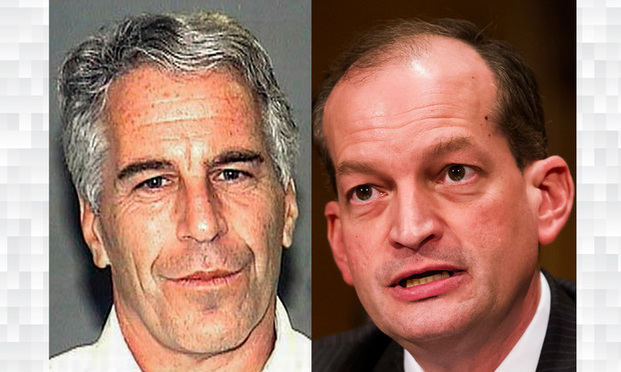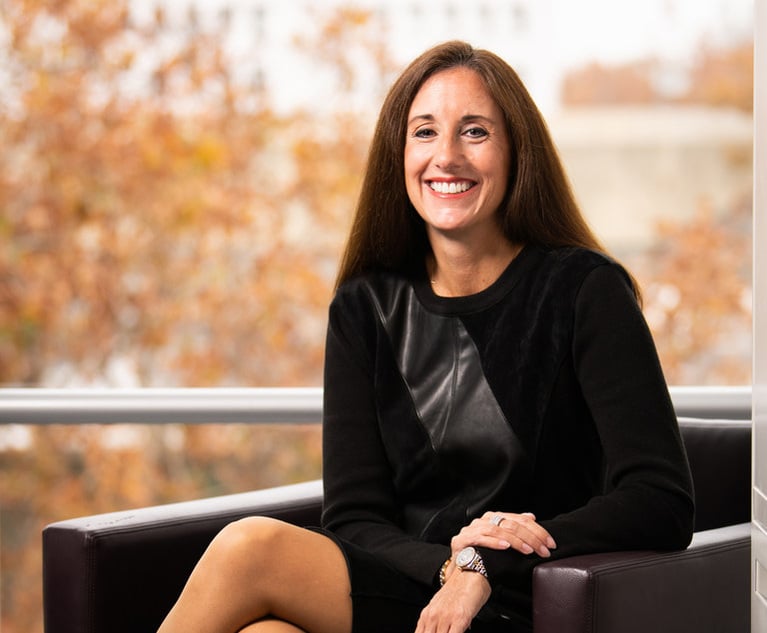Daily Dicta: Why Jeffrey Epstein's All-Star Defense Team May Be the Victim of Its Own Success
The lawyers who represented Epstein can't be faulted for trying to get the best deal possible for their client. That was their job, and they did it well. Maybe too well.
December 05, 2018 at 01:27 PM
8 minute read
The original version of this story was published on Litigation Daily
 Jeffrey Edward Epstein, billionaire pedophile, left, and R. Alexander Acosta, Secretary of Labor, right,.
Jeffrey Edward Epstein, billionaire pedophile, left, and R. Alexander Acosta, Secretary of Labor, right,.
Is there such a thing as getting too good a deal for your client?
In devastating detail, the Miami Herald last week laid out billionaire Jeffrey Epstein's secret sweetheart plea to dodge charges that he sexually abused and trafficked dozens of underage girls.
The 2008 deal was signed off on by Alexander Acosta—at the time the U.S. Attorney for the Southern District of Florida and now Secretary of Labor—who has rightly found himself in the hot seat.
“Why Does Alex Acosta Still Have a Job?” the New York Times asked. “The Labor Secretary Went Easy on a Pedophile; He Must Be Fired, Right Now,” opined the Daily Beast. “Lawmakers call for investigation of Labor Secretary Acosta after scathing report,” USA today wrote. Even Fox News isn't defending him. “Trump Labor Secretary Alexander Acosta went easy on pedophile predator who ensnared victim at Mar-a-Lago: report.”
But what about the lawyers who represented Epstein? They include Kirkland & Ellis partner Jay Lefkowitz, as well as Kenneth Starr, Alan Dershowitz, white collar giants Roy Black and Gerald Lefcourt, and former U.S. Attorney Guy Lewis.
They can't be faulted for trying to get the best deal possible for their client. That was their job, and they did it well.
Maybe too well.
 Because they so thoroughly steamrolled Acosta and federal prosecutor A. Marie Villafaña, the non-prosecution agreement could still be invalidated 10 years later.
Because they so thoroughly steamrolled Acosta and federal prosecutor A. Marie Villafaña, the non-prosecution agreement could still be invalidated 10 years later.
Two Jane Does challenged Epstein's non-prosecution deal, alleging that the feds violated the Crime Victims Rights Act by failing to tell them about it. A decade later, their suit remains pending in Miami federal court.
In the #MeToo era—and now under the spotlight—U.S. District Judge Kenneth Marra in the Southern District of Florida may find it difficult to side with the prosecutors.
The remedy for violating that act isn't entirely clear. One can only hope that Epstein, at least in theory, could still go to federal prison. (And yes poor fellow, leave his luxury estate on his private island in the U.S. Virgin Islands.)
In 2008, Epstein pleaded guilty to two state felony offenses of solicitation of prostitution—even though the “prostitute” was 14 and below the legal age of consent—and procurement of minors for prostitution.
He served 13 months in the private wing of the Palm Beach County jail, where according to the Miami Herald, he had work release privileges that allowed him to go to his office six days a week for 12 hours a day, never mind that sex offenders weren't supposed to be eligible for work release.
He was also required to register as a sex offender and pay restitution to three dozen victims.
But he could have faced life in federal prison—and according to the Miami Herald, the evidence against him was overwhelming.
“This was not a 'he said, she said' situation. This was 50-something 'shes' and one 'he'—and the 'shes' all basically told the same story,'' retired Palm Beach Police Chief Michael Reiter, who supervised the police probe, told the Herald.
It's not clear exactly how defense counsel persuaded Acosta (who was in his late 30s at the time and had no prior experience as a prosecutor) and his underlings to accept such a lenient deal. What's key now is that the agreement also included a confidentiality provision.
Why did Acosta's office go along with it?
“A reasonable inference from the evidence is that the U.S. Attorney's Office—pushed by Epstein—wanted the non-prosecution agreement kept from public view because of the intense public criticism that would have resulted from allowing a politically-connected billionaire who had sexually abused more than 30 minor girls to escape from federal prosecution with only a county court jail sentence,” wrote Bradley Edwards of Edwards Pottinger in Fort Lauderdale, who represents the Jane Does, in court papers.
“Another reasonable inference,” he continued, “is that the office wanted the agreement concealed at this time because of the possibility that the victims could have objected to the agreement in court and perhaps convinced the judge reviewing the agreement not to accept it.”
Just one problem with the tactic: Under the Criminal Victims Rights Act, victims are supposed to be kept in the loop.
And indeed, the two Jane Does who are challenging the deal both received victim notification letters, where the Justice Department promised it would make its “best efforts” to protect their rights, including the right “to be reasonably heard at any public proceeding in the district court involving…plea.”
According to their complaint, they were strung along by Acosta's office, which told them that their cases were still “currently under investigation” for months after the non-prosecution agreement was signed.
Calling the non-prosecution agreement “simply illegal,” they've asked the court to invalidate it.
The case is moving in slow-motion. Perhaps Marra is not too eager to poke this hornet's nest.
The last substantive filing was last year, when the government argued that the petitioners invoked the non-prosecution agreement “in order to prevail in their civil money damage lawsuits against Epstein,” wrote AUSA Dexter Lee.
“Now that victory has been secured in the civil lawsuits, petitioners condemn the same non-prosecution agreement that they wielded as a sword, claiming that it is the product of a conspiracy between Epstein's attorneys and the government, and the subject of deliberate concealment by the government. Petitioners cannot have it both ways. Judicial estoppel should be applied to bar their claims.”
Except the victims were not told of the agreement, and they never had the chance to protest it.
Which leaves me with the same question for the U.S. Attorney's Office for the Southern District of Florida: Whose side are you on anyway?
What I'm Reading
Once Again, California Tops the 'Judicial Hellholes' List
Yes, but at least the weather is nice.
2nd Circuit Finds FBI Leaks Don't Sink Professional Gambler's Insider-Trading Conviction
“The court certainly does not condone the conduct, but we are hard-pressed to conclude that the leaking by a government official of confidential information to the press 'shocks the conscience,'” the panel stated.
The court found that the federal law would have an outsized, chilling effect on speech protected by the First Amendment “on a hotly debated issue in our society.”
Trump's Former Ethics Czar Passantino Reflects on White House's Legal Challenges
“This administration came in with the understanding that we are here to overturn the apple cart,” he said.
State AGs Emerging as 'Most Feared Regulators,' O'Melveny Attorney Says
There's more state action to come: Democrats picked up AG seats in four key battleground states in the recent midterm elections, and now hold a 27-24 majority of the nation's AG offices.
Texas Lawyer Drops $100 Million Lawsuit Against Online Critic Who Called Him 'Nazi'
Good call.
In case you missed it…
Daily Dicta: Sleep is Overrated: Kirkland's Hurst Wins Second Mega-Trial in Three Weeks
How does James Hurst do it? “Lots of advanced planning, a high tolerance for very little sleep, and the support of extraordinarily talented trial lawyers.”
This content has been archived. It is available through our partners, LexisNexis® and Bloomberg Law.
To view this content, please continue to their sites.
Not a Lexis Subscriber?
Subscribe Now
Not a Bloomberg Law Subscriber?
Subscribe Now
NOT FOR REPRINT
© 2025 ALM Global, LLC, All Rights Reserved. Request academic re-use from www.copyright.com. All other uses, submit a request to [email protected]. For more information visit Asset & Logo Licensing.
You Might Like
View All
EB-5 Rebounds After a Rocky Year: Challenges of 2024 Lay Groundwork for a Booming 2025

Leveraging the Power of Local Chambers of Commerce: A Second-Career Lawyer’s Guide to Building a Thriving Practice
5 minute read
CFPB Proposes Rule to Regulate Data Brokers Selling Sensitive Information
5 minute read
Shifting Battlegrounds in Administrative Law, From Biden to Trump II
Trending Stories
- 1States Accuse Trump of Thwarting Court's Funding Restoration Order
- 2Microsoft Becomes Latest Tech Company to Face Claims of Stealing Marketing Commissions From Influencers
- 3Coral Gables Attorney Busted for Stalking Lawyer
- 4Trump's DOJ Delays Releasing Jan. 6 FBI Agents List Under Consent Order
- 5Securities Report Says That 2024 Settlements Passed a Total of $5.2B
Who Got The Work
J. Brugh Lower of Gibbons has entered an appearance for industrial equipment supplier Devco Corporation in a pending trademark infringement lawsuit. The suit, accusing the defendant of selling knock-off Graco products, was filed Dec. 18 in New Jersey District Court by Rivkin Radler on behalf of Graco Inc. and Graco Minnesota. The case, assigned to U.S. District Judge Zahid N. Quraishi, is 3:24-cv-11294, Graco Inc. et al v. Devco Corporation.
Who Got The Work
Rebecca Maller-Stein and Kent A. Yalowitz of Arnold & Porter Kaye Scholer have entered their appearances for Hanaco Venture Capital and its executives, Lior Prosor and David Frankel, in a pending securities lawsuit. The action, filed on Dec. 24 in New York Southern District Court by Zell, Aron & Co. on behalf of Goldeneye Advisors, accuses the defendants of negligently and fraudulently managing the plaintiff's $1 million investment. The case, assigned to U.S. District Judge Vernon S. Broderick, is 1:24-cv-09918, Goldeneye Advisors, LLC v. Hanaco Venture Capital, Ltd. et al.
Who Got The Work
Attorneys from A&O Shearman has stepped in as defense counsel for Toronto-Dominion Bank and other defendants in a pending securities class action. The suit, filed Dec. 11 in New York Southern District Court by Bleichmar Fonti & Auld, accuses the defendants of concealing the bank's 'pervasive' deficiencies in regards to its compliance with the Bank Secrecy Act and the quality of its anti-money laundering controls. The case, assigned to U.S. District Judge Arun Subramanian, is 1:24-cv-09445, Gonzalez v. The Toronto-Dominion Bank et al.
Who Got The Work
Crown Castle International, a Pennsylvania company providing shared communications infrastructure, has turned to Luke D. Wolf of Gordon Rees Scully Mansukhani to fend off a pending breach-of-contract lawsuit. The court action, filed Nov. 25 in Michigan Eastern District Court by Hooper Hathaway PC on behalf of The Town Residences LLC, accuses Crown Castle of failing to transfer approximately $30,000 in utility payments from T-Mobile in breach of a roof-top lease and assignment agreement. The case, assigned to U.S. District Judge Susan K. Declercq, is 2:24-cv-13131, The Town Residences LLC v. T-Mobile US, Inc. et al.
Who Got The Work
Wilfred P. Coronato and Daniel M. Schwartz of McCarter & English have stepped in as defense counsel to Electrolux Home Products Inc. in a pending product liability lawsuit. The court action, filed Nov. 26 in New York Eastern District Court by Poulos Lopiccolo PC and Nagel Rice LLP on behalf of David Stern, alleges that the defendant's refrigerators’ drawers and shelving repeatedly break and fall apart within months after purchase. The case, assigned to U.S. District Judge Joan M. Azrack, is 2:24-cv-08204, Stern v. Electrolux Home Products, Inc.
Featured Firms
Law Offices of Gary Martin Hays & Associates, P.C.
(470) 294-1674
Law Offices of Mark E. Salomone
(857) 444-6468
Smith & Hassler
(713) 739-1250






